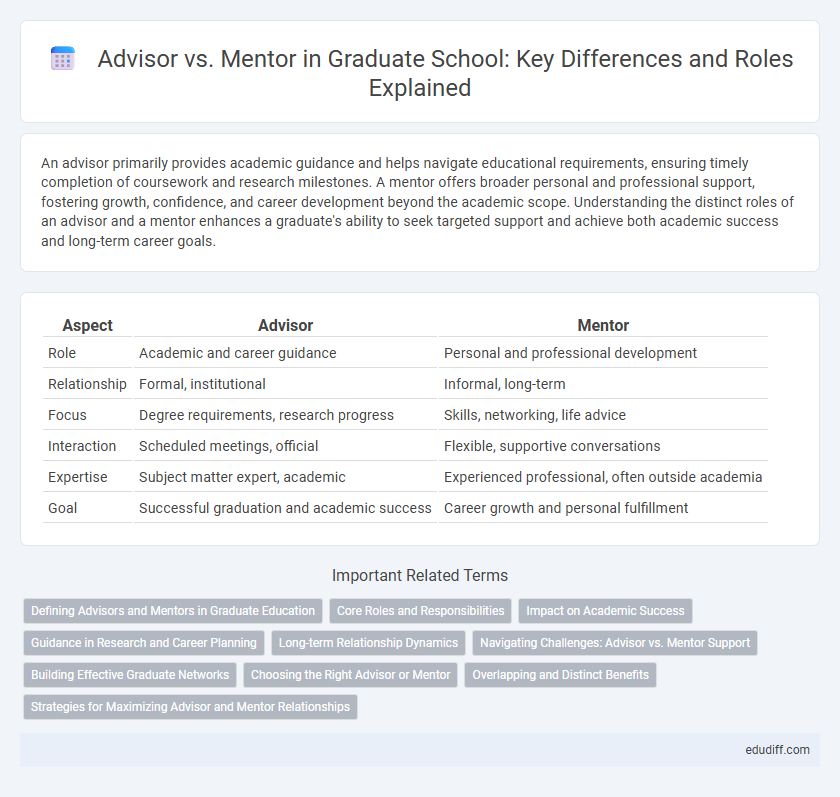An advisor primarily provides academic guidance and helps navigate educational requirements, ensuring timely completion of coursework and research milestones. A mentor offers broader personal and professional support, fostering growth, confidence, and career development beyond the academic scope. Understanding the distinct roles of an advisor and a mentor enhances a graduate's ability to seek targeted support and achieve both academic success and long-term career goals.
Table of Comparison
| Aspect | Advisor | Mentor |
|---|---|---|
| Role | Academic and career guidance | Personal and professional development |
| Relationship | Formal, institutional | Informal, long-term |
| Focus | Degree requirements, research progress | Skills, networking, life advice |
| Interaction | Scheduled meetings, official | Flexible, supportive conversations |
| Expertise | Subject matter expert, academic | Experienced professional, often outside academia |
| Goal | Successful graduation and academic success | Career growth and personal fulfillment |
Defining Advisors and Mentors in Graduate Education
Advisors in graduate education primarily guide students through academic requirements, research planning, and degree completion, ensuring adherence to institutional policies and timelines. Mentors provide broader professional and personal support, fostering career development, networking, and skill-building beyond the formal curriculum. Distinguishing advisors from mentors clarifies their complementary roles in enhancing graduate student success and holistic growth.
Core Roles and Responsibilities
An advisor primarily guides graduate students through academic requirements, research planning, and administrative processes, ensuring timely degree completion. A mentor offers broader support, including professional development, career advice, and emotional encouragement, fostering long-term personal and professional growth. Both roles complement each other, with advisors focusing on structured academic progress and mentors addressing holistic development.
Impact on Academic Success
An advisor provides structured guidance on course selection, research requirements, and academic policies, directly influencing a graduate student's ability to meet program milestones and graduate on time. Mentors offer personalized support, career advice, and networking opportunities that foster professional growth and enhance motivation, which are crucial for long-term academic success. Both roles complement each other, with advisors ensuring academic compliance and mentors promoting holistic development, significantly impacting graduate achievement.
Guidance in Research and Career Planning
An advisor plays a critical role in providing structured guidance on research methodology, project milestones, and academic requirements, ensuring timely progression and compliance within graduate programs. A mentor offers broader career planning support, including professional development, networking opportunities, and personal growth advice that extends beyond immediate academic tasks. Effective collaboration between advisors and mentors enriches graduate students' research experience and career trajectory, enhancing both scholarly output and long-term professional success.
Long-term Relationship Dynamics
Advisors typically provide structured guidance on academic progress, research direction, and career planning, establishing a formal and goal-oriented relationship with graduate students. Mentors offer a broader, long-term support system encompassing personal growth, professional development, and networking beyond immediate academic concerns. The enduring mentor-mentee relationship fosters trust and holistic development, often extending well beyond graduation and career milestones.
Navigating Challenges: Advisor vs. Mentor Support
Graduate students often navigate complex academic challenges with the guidance of advisors and mentors, each offering distinct support frameworks. Advisors provide structured assistance focused on curriculum requirements, research milestones, and compliance with institutional policies, ensuring progress toward degree completion. Mentors offer personalized guidance through career development, emotional support, and professional networking, helping graduates overcome personal and professional obstacles beyond academic demands.
Building Effective Graduate Networks
Building effective graduate networks hinges on distinguishing between advisors and mentors, each playing distinct roles in academic and professional development. Advisors provide structured guidance on research direction, degree requirements, and academic progress, while mentors offer personalized support, career advice, and emotional encouragement throughout the graduate journey. Leveraging both relationships fosters a comprehensive support system that enhances scholarly achievement and career advancement in graduate studies.
Choosing the Right Advisor or Mentor
Selecting the right advisor or mentor is crucial for graduate success, influencing research direction, career development, and academic networking. Effective advisors provide structured guidance on thesis progress, while mentors offer broader professional and personal support. Evaluating candidates based on expertise alignment, communication style, and availability ensures a supportive relationship tailored to individual graduate goals.
Overlapping and Distinct Benefits
Advisors and mentors both provide essential guidance for graduate students, with advisors primarily offering academic and research support tailored to degree requirements. Mentors contribute a broader range of benefits, including career development, personal growth, and networking opportunities beyond the immediate academic environment. Understanding the overlapping roles helps students maximize support while leveraging their distinct functions for comprehensive professional and personal advancement.
Strategies for Maximizing Advisor and Mentor Relationships
Graduate students benefit from clearly defining roles: advisors typically guide research direction and academic progress, while mentors provide broader career advice and personal development support. Scheduling regular meetings, setting transparent goals, and actively seeking feedback enhance communication and trust with both advisors and mentors. Leveraging the unique expertise of each, students should diversify their network to gain comprehensive insights and drive academic and professional success.
Advisor vs Mentor Infographic

 edudiff.com
edudiff.com